Java Guessing Game With Play Again Fucntion
Note: You'll demand to know about for loops and if statements for this guessing game, so y'all'll need to have read all but the terminal of the beginner tutorials or already know all of these concepts.
In this guessing game, the reckoner will come with a random number between ane and 1000. The player must and then continue to guess numbers until the player guesses the correct number. For every guess, the computer will either say "Besides high" or "Too low", and then ask for another input. At the terminate of the game, the number is revealed along with the number of guesses it took to become the correct number. Ready to follow forth to create this guessing game? All correct.
First, we're going to start by creating a new class, or Coffee file. Call your new program GuessingGame, keeping the capitalization the same. If you're using Eclipse (and I strongly urge you to!) and so make sure to checkmark the box to have it put in your chief method for you. You should start out like this:
Ok, we demand the computer to generate random numbers. Just add together this code inside your main method so you have this:
Don't worry much about how Random works. All y'all need to know for this guessing game is that the variable numberToGuess holds the integer that the player has to guess. Notice y'all'll get an mistake when you endeavour to use Random. This is the same problem that Scanner has. All you take to exercise is right-click your work area, go to source, and select Organize Imports. This will take care of the problem for y'all. If y'all want to but import manually, type in import coffee.util.Random; at the very summit of the page.
Now, we demand to finish and effigy out exactly what we demand our game to exercise and how nosotros're going to accomplish this goal. Information technology's best to practise this planning Before you beign coding, and so let's outset by listing what the guessing game needs to do, also known every bit the requirements of the plan.
This is a small list, but it does say everything we demand to do for our guessing game to work. We already took care of the kickoff need, which was to create a random number. So, let's move on to the next requirement, keeping track of the number of guesses.
To proceed track of annihilation, you need a variable. In this example, since we're keeping track of guesses, a simple integer variable volition exercise. Add together an int variable to your lawmaking, and commencement information technology off at 0, since at the first the actor has made no guesses.
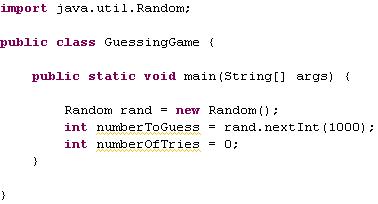
So far we have the variable, but it still does non keep track of the number of guesses. At this point information technology doesn't make sense to brand it practise so because the user isn't being asked to make any guesses yet.
Permit's take the estimator ask us to gauge a number. This is pretty unproblematic, and something you've known how to do since the Hello World tutorial if yous've been post-obit along.
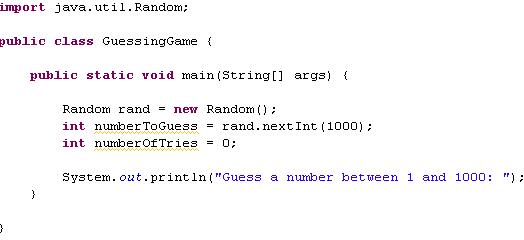
Ok, so that requirement is completely done and you can scratch it off your to-practise listing. Now, we need the player to be able to input the number. This means we're going to need a Scanner.
I similar to define all my variables as loftier up in the code as possible, and I suggest you lot attempt to do the same. It helps you keep rails of all the dissimilar variables yous accept and makes certain that you don't accidentally apply the same variable twice. So, create a Scanner at right nether your variable that keeps rail of the number of guesses. You know how to create a Scanner by now, correct? :)
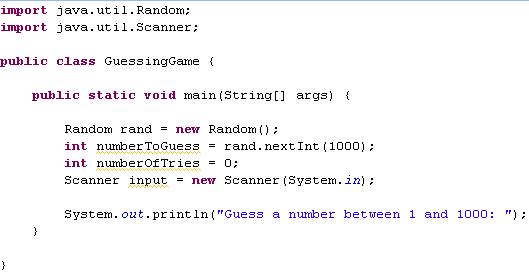
At present that nosotros accept a scanner to use, we demand to actually have a variable that stores the input from the user. Y'all can create this variable at the top as well, just don't make information technology equal anything still. Call up how this is done?
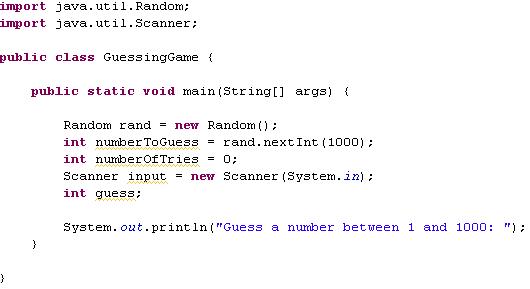
Now with this variable, under where the computer asks for input, accept your new variable store the input from the scanner. Recollect, the thespian will be guessing integers, and then having the variable be an integer is a must. Also, recollect that using nextLine() with Scanner probably isn't the all-time approach here. Exercise you think what to use instead for integers?
Once y'all've written the lawmaking to take input, you can scratch that off of your requirements listing.
The computer then needs to tell united states of america if this approximate was too high or likewise low. Notice how in that sentence I used the word if. That's a big clue every bit to what you lot need to use to accomplish this. Allow's break downwardly the if statement.
- If the number guessed is higher than the real number, tell us its too loftier.
- If the number guessed is smaller than the real number, tell u.s.a. its too depression.
- If the number guessed is the same equally the existent number, tell us that nosotros won.
Yous could practise this in 3 different if statements, but it'due south all-time to use else if in this case to necktie them all together. It helps to testify that all those if's are related to each other, and that only one of those if'southward will e'er be true at in one case (the guessed number can never be too high and too low at the same time, for instance).
This is what your code should look like at this bespeak:
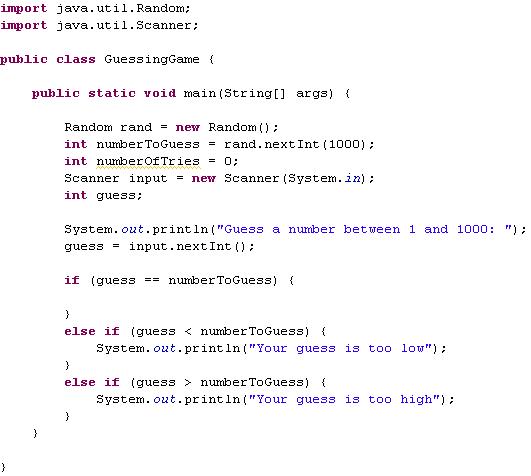
Great, we can cross of another requirement off of our list. This is what we accept left to practice:
- Keeps rails of number of guesses (remember we but finished part of it)
- Keeps playing until nosotros guess the correct number
- Tells us the correct number and the number of tries
Allow's tackle the first item on that listing and get rid of information technology once and for all. When should we track the number of guesses? Correct later the role player guesses the number of grade! But add together i to the variable we created to exercise this after the actor guesses a number. That's all at that place is to information technology!
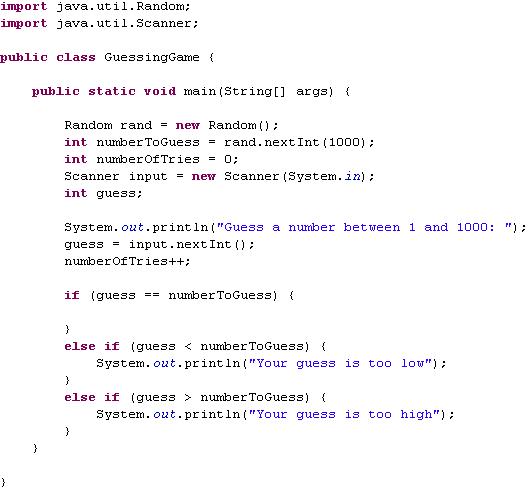
Okay, so if we were to run our guessing game correct now, the plan would go one fourth dimension, and and so terminate. This is because we need information technology to go along going until the user wins. We will have to think virtually this a little bit before we lawmaking it.
Outset of all, what ways exercise we know to make Coffee practise something over and once more? In the tutorials nosotros went over 2 ways, the for loop and the while loop. If you call back the difference, then you know that the for loop loops for a certain number of times. Unfortunately the number of times this programme could loop depends on the actor! And so, a for loop is probably not the all-time fashion to handle this.
A while loop is the perfect choice. Information technology keeps going until a condition is no longer truthful. So, while the player hasn't won withal, keep going. But how practise nosotros keep track of whether or non the player has won?
Simple. Nosotros use a boolean variable. We can create a boolean variable called win near the acme of our code with all the other variables. If we set up win to false, then it means the player hasn't won yet. When win is truthful, so the player won the game.
The last matter we demand to effigy out is which code to put inside of this while loop. I recommend everything starting from the figurer asking the histrion to guess a number all the style down to the if statements.
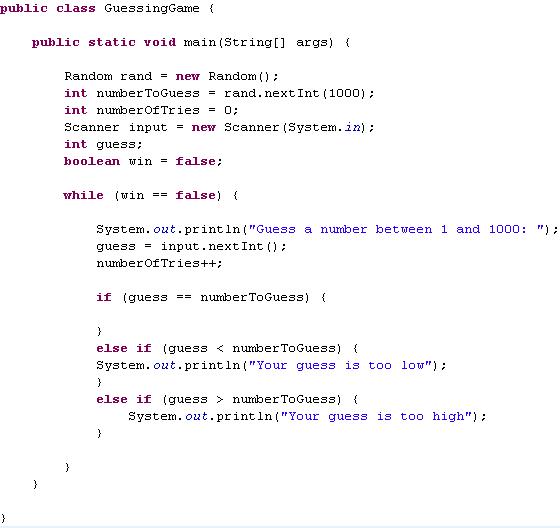
Run into how inside the while loop parenthesis the condition is when win is equal to false? This means it will go on to loop until something sets the win variable to true.
But what will prepare the win variable to true? The third part of the if argument seems like a skilful choice. Y'all know, the part that asks if the histrion guessed the correct number. Here is what this looks like:
Phew, so now nosotros've gotten rid of all the requirements except one. We need the game statistics when the game is over. Ok, subsequently your while loop, we can add the code in. Information technology should just be a series of printlns that tell the states everything we demand to know, such every bit number of guesses fabricated.
Your guessing game program is now complete!
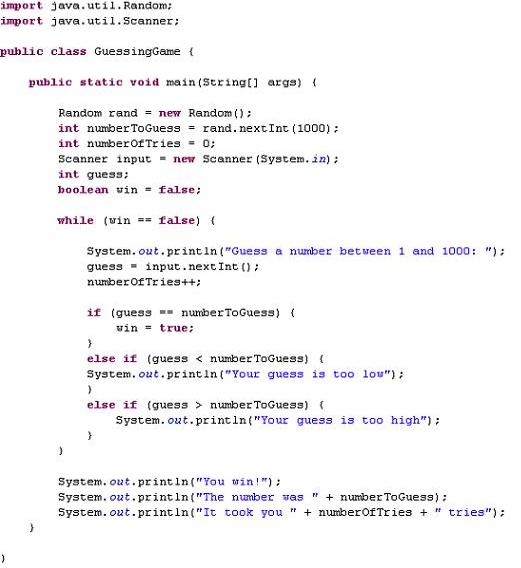
Get ahead and play information technology. I wouldn't try guessing messages or anything like that, as your program will crash. Withal, the game does work, and so bask or evidence it off!
Note: By the way, to brand the guessing game harder or easier, merely modify the number inside of the parenthesis of the Random variable we created. You tin change it from 1000 to x and then information technology creates a number from 1 to 10, or you tin can brand the number larger. Have fun!
**Editor's Annotation: The game actually picks a number between 0 and 999, not i and g. You can add together one to the numberToGuess variable to ready that upshot.
If you have whatever questions, comments, or concerns, feel free to contact united states of america.
Source: https://www.java-made-easy.com/guessing-game.html
0 Response to "Java Guessing Game With Play Again Fucntion"
Postar um comentário